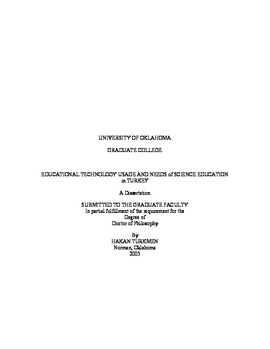| dc.contributor.advisor | Pedersen, Jon E., | en_US |
| dc.contributor.author | Turkmen, Hakan. | en_US |
| dc.date.accessioned | 2013-08-16T12:19:54Z | |
| dc.date.available | 2013-08-16T12:19:54Z | |
| dc.date.issued | 2005 | en_US |
| dc.identifier.uri | https://hdl.handle.net/11244/915 | |
| dc.description.abstract | Integrating technology into teaching and learning in Turkish education is a slow, time-consuming process that requires substantial levels of support and encouragement and requires patience and understanding. In light of efforts by the Turkish government, Turkish faculty members who earned their degrees from western universities, and graduate students earning degrees from American universities will be leaders on the long road to change. | en_US |
| dc.description.abstract | The purpose of this study was to examine Turkish science teachers and pre-service teachers' attitudes towards the use of technological tools in their science lessons in Turkish colleges of education in the assist of Turkish government projects, and how science education teachers, who have earned a science education degree from western countries, influence the use technology in Turkish higher education. | en_US |
| dc.description.abstract | Major findings of the study include: (1) Science education faculty members who have earned science education degrees from western countries have a positive effect on the use of technological tools in science courses in Turkish higher education. (2) Science education faculty members who have earned science degrees from Turkish universities have a limited knowledge on the use of technological tools in science courses in Turkish higher education. (3) Science education graduate students who have been studying in science education in western countries have positive attitudes for the use of technological tools in science courses have potential to impact Turkish higher education, when they return to Turkey. (4) Most Turkish pre-service teachers know very little about effective use of technology in education. Gender differences are apparent and females consistently indicated that they knew less and hence may not integrate technological tools in their teaching. (5) Turkish pre-service or new teachers are exposed to teacher educators that do not sufficiently model the appropriate use of computers for instructional purposes, either in courses or in field experiences. The technology that is used focuses more on older and simpler instructional applications of computer technology (e.g., computer assisted instruction, word processing) and older educational technologies (e.g., overhead projectors, calculators, slides). (6) Faculty rank in general, made little vis-a-vis technology use in knowledge. | en_US |
| dc.description.abstract | The research method employed were quantitative data sources, including a technology background questionnaire, which is cross-sectional design, and qualitative historical research data sources. The study analyzed the data under a cross-section or between subjects' method with four factors: Turkish science teachers; Turkish pre-service science teachers; Turkish science teachers who have earned science degrees from western universities; and Turkish graduate students whose majors are in science education in U.S. It was anticipated that an analysis of variance (ANOVA) would be used to analyze data and "level 0.05" was established. | en_US |
| dc.format.extent | xii, 220 leaves : | en_US |
| dc.subject | Science Study and teaching Turkey Public opinion. | en_US |
| dc.subject | Computer-assisted instruction Turkey Public opinion. | en_US |
| dc.subject | Education, Technology of. | en_US |
| dc.subject | Education, Sciences. | en_US |
| dc.subject | Education Data processing Turkey Public opinion. | en_US |
| dc.subject | Science Computer-assisted instruction Turkey Public opinion. | en_US |
| dc.subject | Education, Curriculum and Instruction. | en_US |
| dc.subject | Student teachers Turkey Attitudes. | en_US |
| dc.subject | Public opinion Turkey. | en_US |
| dc.subject | Science teachers Turkey Attitudes. | en_US |
| dc.title | Educational technology usage and needs of science education in Turkey. | en_US |
| dc.type | Thesis | en_US |
| dc.thesis.degree | Ph.D. | en_US |
| dc.thesis.degreeDiscipline | Department of Instructional Leadership and Academic Curriculum | en_US |
| dc.note | Adviser: Jon E. Pedersen. | en_US |
| dc.note | Source: Dissertation Abstracts International, Volume: 66-08, Section: A, page: 2826. | en_US |
| ou.identifier | (UMI)AAI3186962 | en_US |
| ou.group | Jeannine Rainbolt College of Education::Department of Instructional Leadership and Academic Curriculum | |
